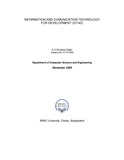Information and communication technology for development (ICT4D)
Abstract
This thesis paper is all about the ICT4D in Bangladesh contents. I have done some
researches and activities during my internee period in GKP’s host organization BFES
as GKP-Youth Fellow. As the Information and Communication Technology (ICT)
revolution is rapidly taking the world by storm Bangladesh is playing its part to reach
the frontline. To utilize ICT for development, we need proper planning, since our
resources are limited, our opportunities are also limited but we have unlimited desires.
For proper use of ICT we have to make an organized plan taking into account these
practical issues. One of the first steps should be introduction of ICT to our rural and
urban young group. A matter of great sorrow is that only some of facilities about ICT
are available in urban areas, but in our rural areas there are almost no existences of
ICT facilities. Therefore, one of our main targets should be reduce the digital divide.
Students of different universities in our country learn IT at universities. These
students can immensely help the development of ICT in their own villages and small
towns.
I have achieved the chance to research on one of ICT4D project of GKP member
organization Bangladesh Friendship Education Society (BFES) as GKP-Youth
Fellow. During the internee period I am introduced with different activities of some
international organizations such as WSIS, UNDP ICT4D project, SDC etc. In this
thesis paper I have tried to explain those activities in the contents of Bangladesh. This
paper is also included the activities of Amader Gram ICT4D project, where people
from different stages and backgrounds of society are learning ICT to change their
society into knowledge base. In this regards I have given an action plan for my
internee and tried to follow that plan during internee. At the end of this paper there are
some suggestions, practice examples from other countries and opportunities are
focused. I have added those from my idea and experiences and from some web
resources. Here I just tried to show that all those practices are suitable for Bangladesh.
The subject of e-government is very broad. It is the use and application of ICT for
good governance. If we can provide better information through ICT at all levels. We
will also improve the level of efficiency and transparency of government. We also
4
need to give citizens the opportunity to call back. The internet can be a means of
informing and also gaining information from citizens.
Building information societies is always based on the history and the local conditions
of country. This means that an information society can be done to share information,
experiences and best practices. The information society has a huge potential in
offering equal opportunities to all members of the community to enhance their wellbeing
and quality of life.
It is significant that the poor are often illiterate and have no assets like land, livestock,
fishpond or productive skills. Often they survive on uncertain wage labors. Therefore,
building assets has to be the major goal of any poverty alleviation effort. Facilitating a
paradigm shift from unskilled to skilled work is basic to both poverty reduction and a
healthy and productive life.
ICT are such as computers, mobile phones, radio, TV, video and the internet effective
instruments to empower people, reduce poverty and improve life.

